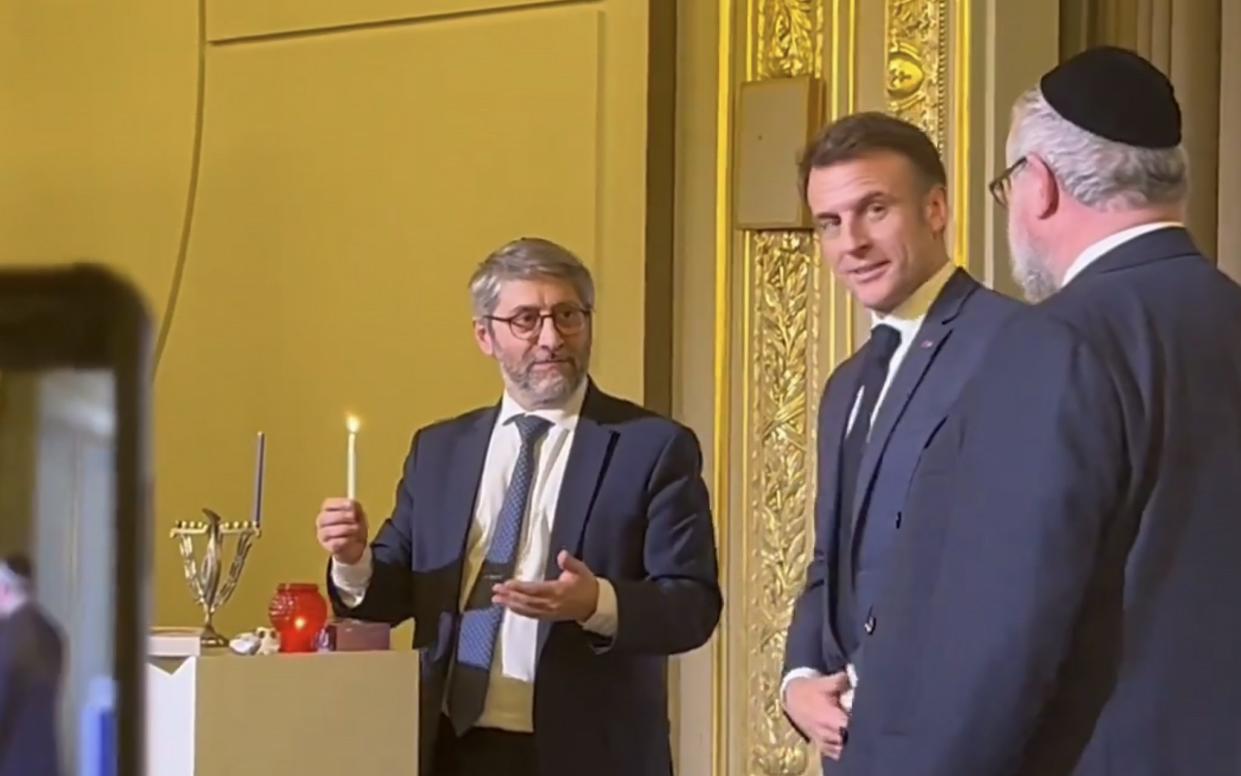Macron ignites secularism row over Hanukkah ritual at presidential palace

- Oops!Something went wrong.Please try again later.
Emmanuel Macron has triggered a secularism row for attending the lighting of the candle for Hanukkah, a move branded a “mistake” by the head of France’s top Jewish group.
On Thursday evening, Haïm Korsia, France’s chief rabbi, lit a candle to mark the eight-day Jewish festival of light in the presence of the French president at the Élysée Palace.
While such an event wouldn’t raise eyebrows in the UK, Church and State are kept strictly separate in France under a 1905 law, which celebrates its anniversary on Dec 9.
Carole Delga, a Socialist party politician and president of the Occitanie region, wrote: “The Élysée is not a place of worship.”
“Two days before the anniversary of the 1905 law, this is a bad signal sent by the State to the Republic. We cannot compromise with secularism. This common bond is precious but fragile.”
Gesture is a ‘dangerous spiral’
Manuel Bompard, a Left-wing MP from the France Unbowed party, called the gesture “an unforgivable fault” while his colleague Alexis Corbière warned against a “dangerous spiral” and asked: “Will Macron do the same for other religious cults? Some yes, some no?”
Julien Aubert, of the conservative Republicans party and former MP for Vaucluse, said: “Can you imagine a Christmas or Eid mass at the Élysée Palace? It’s not serious.”
Laurence Rossignol, a Socialist party senator, said: “Macron as president is like a 10-year-old with a little chemistry kit, but with real nitroglycerine and real matches.”
Even Yonathan Arfi, the president of the Representative Council of Jewish Institutions in France (Crif), called it a “mistake”.
“It’s not really the place of the Élysée Palace to light a Hanukkah candle, because the Republican DNA is to keep away from anything religious,” he said.
Some asked whether Mr Macron may have been seeking to make amends for not taking part in a march against anti-Semitism, organised by top French officials on the Left and Right in the wake of the Oct 7 Hamas attacks in Israel.
‘David Lisnard, the Right-wing president of the association of French mayors, asked: “How can we refuse to take part in a civic march against anti-Semitism on the incongruous and fallacious grounds of safeguarding national unity, and celebrate a religious festival within the presidential palace?”
With the row snowballing, the French presidency on Friday said Mr Macron did not regret the celebration “at all”, assuring that it had been carried out “in a spirit that is of the Republic and harmony”.
“If the president had lent himself to a religious gesture, or had taken part in a ceremony, that would not be respectful of secularism. But that’s not how it happened,” the Élysée argued.
The candle was lit after Mr Macron had been presented with the annual prize of the Conference of European Rabbis (CER) for combating anti-Semitism and safeguarding religious freedoms.
“The context is very important,” the president’s entourage defended itself in the face of the controversy, stressing that he was not “organising a Hanukkah ceremony”, before adding: “The Chief Rabbi of France, who was present, welcomed the president’s speech of thanks after receiving his prize by lighting the first Hanukkah candle. That’s not quite the same thing as inviting people to take part in a Hanukkah ceremony.”
Elisabeth Borne, the French prime minister, defended the decision.
“There are different ways of sending a signal to the Jewish community... and the message from the president at this time is that we protect and support all those who wish to practice their religion, and in particular the Jewish community,” she insisted.
‘Contradictory signals’
The problem, pointed out by Matthieu Croissandeau, a journalist at French news broadcaster BFMTV, was that Mr Macron is sending “contradictory signals” regarding secularism.
He said: “In the space of three months, we’ve seen the education minister ban the abaya (a Muslim garment) in (state) schools and sent a letter to all parents reminding them that the principle of secularism supposes the neutrality of the state towards everyone, whatever their religion.
“In the same breath, we’ve seen the president attend mass with the Pope in Marseille and now we have a religious candle lit in the Élysée, all that is not very coherent.”
He said the problem was it further muddied the waters regarding laïcité, which is misunderstood and increasingly “contested”.
An Ifop poll published on Friday suggested that 78 per cent of French Muslims feel it “discriminates against Muslims”.
France has reported over 1,500 anti-Semitic acts and comments since the outbreak of the Israel-Hamas war.
In Germany meanwhile, Olaf Scholz on Thursday became the first chancellor to light Berlin’s central Hanukkah menorah, also in a sign of “solidarity” with Jews amid a surge of anti-Semitism during the Israel-Hamas war.
Wearing a kippa, Mr Scholz called for the “immediate” release of Israeli hostages as he addressed a crowd gathered at the Brandenburg Gate for the start of the Jewish festival of lights.

